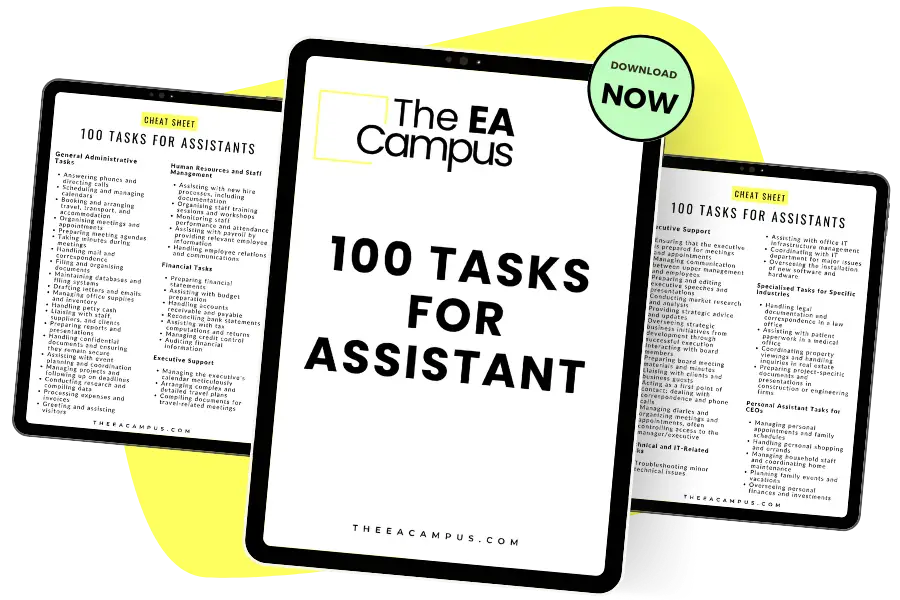Let’s explore the foundation of what we do—our skills—and the EA competencies you will need to thrive in the role. We’ll cover:
Being organized and having good time management are competencies that will always be essential in the Assistant profession. They are at the heart of what makes a fantastic Assistant. We help our Executive stay organized and save them time.
There is an abundance of fantastic technology available to help you manage time, productivity, and coordination. However, you still need to have an organized mindset.
Keeping someone else organized is challenging. You must know where everything is, keep a close eye on project deadlines, ensure all the correct paperwork and files are stored properly, track when meetings are due to finish and when the next one starts, and schedule your Executive’s day accurately.
Effective communication remains a critical competency for Assistants and will become even more important as AI continues to advance. Assistants must cut through the noise, get to the heart of the matter, and communicate what is required in any situation.
Assistants will continue to work with a diverse range of personality types, levels of seniority, and backgrounds. As such, they must adapt their communication style to convey messages effectively and efficiently.

This List of Tasks for Executive Assistants Download helps you recall and record every task you handle, supports you in writing polished CVs and precise job descriptions, and recognises additional responsibilities you can undertake.
Some competencies are timeless, and attention to detail is one of them. There are many valuable tools to help with spelling and grammar checks, but the need for a meticulous eye goes beyond that.
Assistants have to make their Executive look good by being aware of the small details that make a difference. This might involve perfecting a client presentation, scheduling time for the Executive to review an important report, or even grabbing a coffee for a busy team member.
Small details matter and will continue to be an area where Assistants can add significant value. It’s one of the key EA competencies you will need to thrive in the role.
This competency is never going away. Maintaining your Executive’s confidence is crucial for many reasons, not least because mutual trust is essential for the partnership to work.
In today’s digital age, Assistants must also be aware of cybersecurity concerns and handle all sensitive information responsibly.
Diplomacy, the art of dealing with people sensitively and tactfully, is crucial for Assistants. It involves communicating with consideration for others’ feelings and potential reactions. This skill allows Assistants to find common ground with individuals at all levels of the organization.
For these reasons, it’s immensely helpful for Assistants to be diplomatic.
Assistants must juggle a packed to-do list, prioritize tasks, and handle urgent questions and requests from multiple colleagues and bosses. The nature of the role demands flexibility in managing multiple priorities.
Remaining flexible while staying on top of responsibilities is essential to thriving in the Assistant role.
As technology increasingly dominates workplace communication, the ability to build relationships and connect with colleagues in person will become even more valuable.
Assistants can stand out by leveraging their interpersonal skills to foster connections, disseminate information, and work effectively within diverse company cultures. These skills are a true value-add in a business environment heavily reliant on technology and remote work.
Intuition is a fantastic competency in any business role, but for Assistants, it’s what elevates them from being good to becoming invaluable business assets.
Why? Because intuition helps you stay one step ahead of your Executive’s needs, anticipate upcoming challenges within the organization, and manage issues proactively. This isn’t about mind-reading (though that would be helpful!); it’s about deeply understanding the business, industry, and your Executive’s style and priorities.
While intuition may come naturally to some Assistants, it can also be developed.
Creativity might not always seem apparent in traditional corporate environments, but it’s a critical skill for problem-solving and innovation.
Creativity isn’t just about producing great presentations or designing logos. It’s about thinking outside the box and finding new ways to approach challenges and tasks.
Last but not least is self-motivation.
To excel in this industry, Assistants must seek out work that makes them stand out and proves their value as a business asset.
In addition to showcasing confidence and promoting yourself (which can be tiresome but necessary), you should volunteer for projects, tackle challenging tasks, and seek opportunities to be seen and heard. This year is about proving your worth to those who may underestimate your contributions.
The power of being an Assistant lies in the combination of skills and competencies required for the job. Without both, it’s challenging to fully maximize your potential and contribute to your organization’s success. A solid foundation of strong skills and sharp competencies can make a significant difference.
Take steps today to invest in yourself by enrolling in the Assistant Mindset Online Course. You’ll learn to uphold and apply these standards in your current role and prepare for future opportunities.
Share this article:
Join 30,000+ Assistants receiving our carefully crafted weekly newsletter packed with valuable tips, tricks, and insights tailored specifically for Assistants like you.